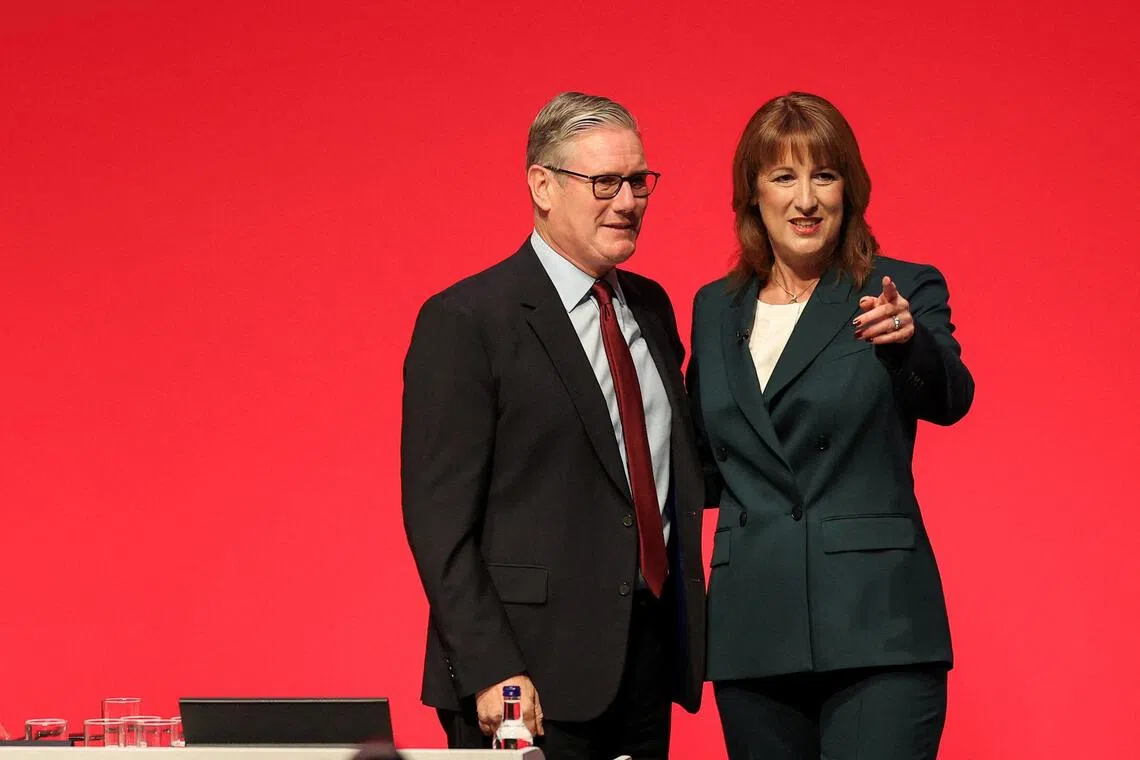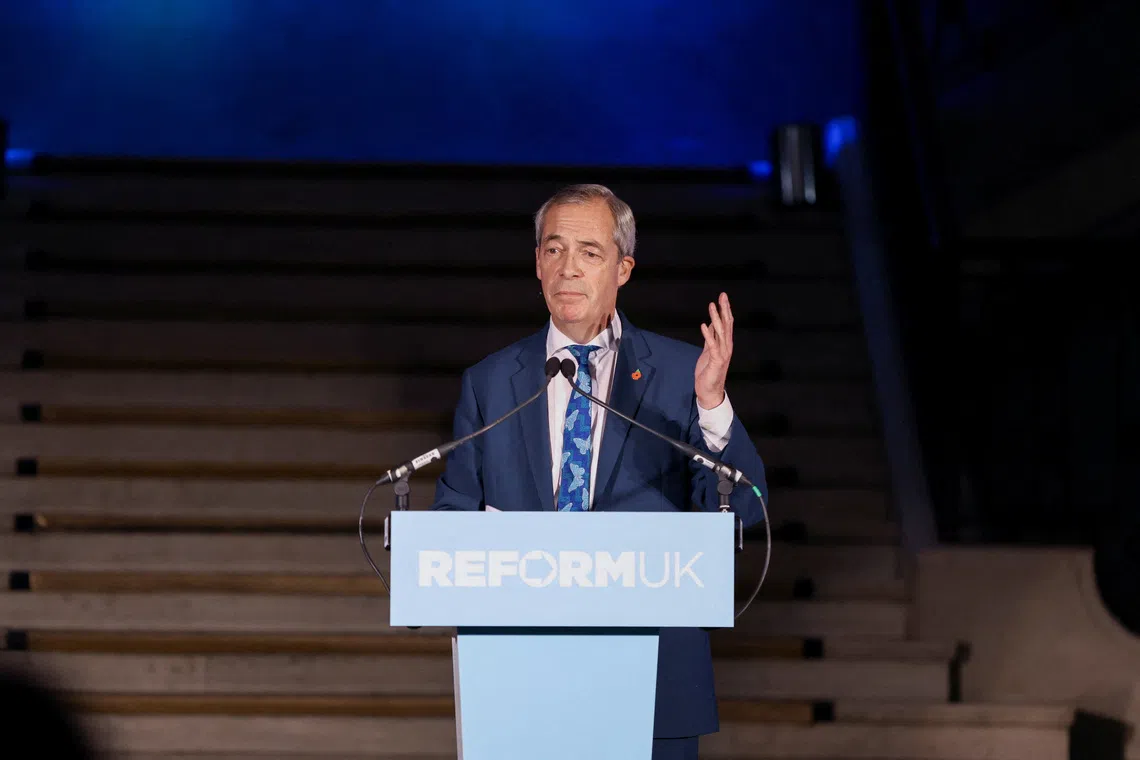News analysis
With Britain’s economy in the doldrums, will Rachel Reeves’ budget finally show Labour can govern?
Sign up now: Get ST's newsletters delivered to your inbox

British Finance Minister Rachel Reeves' annual budget may well seal her fate, and that of Prime Minister Keir Starmer.
PHOTO: REUTERS
Follow topic:
LONDON – A government sitting on a crushing overall parliamentary majority of 169 MPs and with more than three years before it needs to face another general election should feel very relaxed.
Not the British government, however. For, as British Finance Minister Rachel Reeves knows only too well, her annual budget, scheduled to be unveiled to Parliament in London on Nov 26, may well seal her fate, and that of Prime Minister Keir Starmer.
The omens are not good. The British economy is in deep trouble, and Ms Reeves has no scope to offer the sort of spending goodies that can charm the electorate. Britain’s current administration is already one of the least popular in history.
To make matters worse, the country’s entire political elite now faces a sustained challenge from both the extreme right and extreme left of the political spectrum.
Mr Starmer’s centre-left Labour Party returned to power in July 2024
Brexit – as the separation from the EU came to be known – is now widely perceived to have been a grave error, and to have inflicted a heavy toll on the British economy.
The Office for Budget Responsibility – a body of experts called upon to provide impartial financial advice to British decision-makers – estimates that Brexit will cumulatively reduce the country’s economic productivity by at least 4 per cent and impose an even heavier penalty on trade.
“Both exports and imports will be around 15 per cent lower in the long run than if the UK had remained in the EU,” the outfit claimed in its latest report, published on July 30.
Inflation remains high, and food price inflation is particularly so, reaching 4.9 per cent in October.
Meanwhile, productivity is low and growth is sluggish; the average forecast from independent analysts is that the British economy will grow by around 1.2 per cent in the coming year.
The biggest problem is debt. UK government debt now totals a gigantic £2.65 trillion (S$4.5 trillion), the equivalent of 95 per cent of the country’s gross domestic product (GDP), the highest it has been in more than six decades.
There are other European countries – such as Italy and France – with even higher debt-to-GDP ratios. But because Britain’s debt has been rising faster than those of its European neighbours and its management of the national economy has been more haphazard, financial markets want premium interest rates in lending to the UK.
The cost of servicing Britain’s debt has quadrupled since the beginning of this decade and currently stands at around 4 per cent of GDP. In effect, the British are spending twice as much on servicing their debts as they are on their entire military.
So, when the Finance Minister on Nov 26 follows in the long-established tradition of blaming her predecessors for the rickety economy, she will be, for once, justified in making the claim.
The trouble for Ms Reeves and Mr Starmer is that they have compounded the mistakes of their predecessors with plenty of additional errors of their own.
Mr Starmer ran in the July 2024 ballots on a manifesto vowing that, if elected, Labour would not raise taxes
Soon after coming to power, Ms Reeves claimed that the promise not to raise taxes applied only to “working people” rather than employers, so she increased the social security contributions (called national insurance in Britain) that companies have to pay for their workers.
But the move backfired, for it only raised labour costs, fuelling inflation. And the strange distinction between “working people” and employers did nothing to improve the government’s credibility.
Still, Ms Reeves then promised that her tax was a one-off event. “To the working population, I say: I will not raise national insurance, value-added tax, or income taxes. That is a promise made and kept,” she said in October 2024.
Sadly, she has to retract this promise when she presents her budget, for the British government needs to increase taxes.
Mr Starmer’s predicament with pledges he cannot keep is compounded by his accident-prone governance, which stumbles from one crisis to the next.
When he came to power, he cancelled plans of the previous Conservative administration
Instead, Mr Starmer promised that his government would “smash the gangs”
Sadly, the criminal gangs appear to have smashed Britain’s border controls. The number of people arriving in illegal boats from France soared from 21,000 in 2023 to 34,000 in 2024, and 42,000 in just the first 10 months of 2025.
Mr Starmer also promised to reduce welfare spending by restricting payments to older people who struggle to heat their homes during the winter, and to those claiming allowances for physical disabilities.
Yet, both measures caused a public storm and had to be reversed, resulting in the worst of both worlds: Mr Starmer’s damaged reputation and no fix for the country’s broken finances.
Unsurprisingly, therefore, Labour is in the doldrums in opinion polls. If parliamentary elections were held tomorrow, polls indicate that Reform UK, a far-right anti-immigrant movement, would win the vote, and Mr Nigel Farage, its flamboyant leader, would become prime minister.

If parliamentary elections were held tomorrow, polls indicate that Reform UK would win the vote, and Mr Nigel Farage, its flamboyant leader, would become Prime Minister, says the writer.
PHOTO: REUTERS
The party is a recent successor to the previous Brexit Party, a fringe movement initially dismissed by then Conservative Prime Minister David Cameron as a collection of “fruitcakes”, “loonies” and “closet racists”.
But Reform is now not only eating into Labour’s electoral constituency, but also trouncing the opposition Conservatives. Reform’s popularity threatens to torch Britain’s entire political system by ending the country’s century-old political tradition of alternating Conservative and Labour ruling parties.
And although much smaller in size, the Greens and several far-left splinter movements are also eating away at Labour’s potential voters.
For all these reasons, Ms Reeves is under pressure to deliver a budget that can at least restore faith in the government’s competence and stem Labour’s collapse in opinion polls.
But if – as now seems probable – she fails in this objective by having to eat her words again and further raise taxes, a rebellion against both her and Mr Starmer from within the Labour Party is guaranteed in the next few months.
Jonathan Eyal is based in London and Brussels and writes on global political and security matters.


